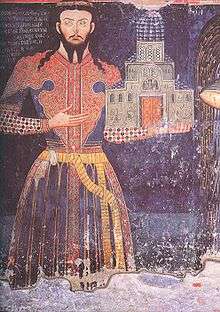Magnate
A magnate, from the late Latin magnas, a great man, itself from Latin magnus, "great", is a noble or a man in a high social position, by birth, wealth or other qualities. In reference to the Middle Ages, the term is often used to distinguish higher territorial landowners and warlords such as counts, earls, dukes, and territorial-princes from the baronage, and in Poland for the richest Szlachta.

England
In England, the magnate class went through a change in the later Middle Ages. It had previously consisted of all tenants-in-chief of the crown, a group of more than a hundred families. The emergence of Parliament led to the establishment of a parliamentary peerage that received personal summons, rarely more than sixty families.[1] A similar class in the Gaelic world were the Flatha. In the Middle Ages a bishop sometimes held territory as a magnate, collecting the revenue of the manors and the associated knights' fees.
In the Tudor period, after Henry VII defeated Richard III at Bosworth Field, Henry made a point of executing or neutralizing as many magnates as possible. Henry VII would make parliament attaint undesirable nobles and magnates, thereby stripping them of their wealth, protection from torture, and power. Henry VII also used the Court of the Star Chamber to have powerful nobles executed. Henry VIII continued this approach in his reign; he inherited a survivalistic mistrust of nobles from his father. Henry VIII ennobled very few men and the ones he did were all "new men": novi homines, greatly indebted to him and having very limited power.
Hungary
The term was specifically applied to the members (equivalent to British Peers) of the Upper House in the Apostolic Kingdom of Hungary, the Főrendiház or House of Magnates.
Poland and Lithuania
Magnates were a social class of wealthy and influential nobility in the Crown of the Kingdom of Poland and Grand Duchy of Lithuania, and later the Polish–Lithuanian Commonwealth.
Serbia

The magnates, velikaši, of Serbia in the Middle Ages were noted by their higher titles in relation to those held by the lesser nobles. In the Early and High Middle Ages the highest (most prestigious) title was vojvoda, a military rank and title of governors. During the Serbian Empire (1345–71) the higher court members held titles such as despot, sevastokrator and kesar. During foreign rule, under the Ottoman Empire, Habsburg Monarchy, Republic of Venice, and later in the Revolution, and Principality the magnates were influential voivodes (though all voivodes were not considered magnates).
Spain
In Spain, since the late Middle Ages the highest class of nobility hold the appellation of Grandee of Spain.
Sweden
In Sweden, the wealthiest medieval lords were known as storman (plural stormän), "great men", a similar description and meaning as the English term magnate.
See also
- Aristocracy
- Szlachta, in Poland
- Boyar, in Eastern Europe
- Velikaš, in Serbia and Croatia
- Magnat (film)
References
- Pugh, T. B. (1972). "The magnates, knights and gentry". In S. B. Chrimes, C. D. Ross and R. A. Griffiths (ed.). Fifteenth-Century England, 1399–1509: Studies in Politics and Society. Manchester University Press. p. 86. ISBN 9780064911269. Retrieved 17 July 2013.
Sources
